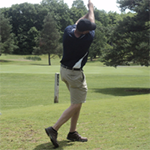Increase Pace of Play? According to Einstein We’re Insane.
How many times have you seen two guys standing by the cart talking to each other instead of hitting the ball?
I would wager that slow has been a topic of debate since the game was invented.
Even from my earliest memories of playing full rounds of golf I can recall people complaining about slow play. That was 45-years ago, which is longer than most of you have been alive, so slow play isn’t a new problem.
Abolishing slow play is everyone’s responsibility, this includes golfers, course owners, professional golf organizations, and membership committees, maybe even the media should have some responsibility to at least add social pressure to those that play slow.
But herein lies the problem, slow players for the most part, don’t recognize they’re slow. Those that do, don’t care. Regardless if they’re called names or are labeled as inconsiderate so-and-so’s they will play a whatever pace they see fit.
For decades the golf world has pressured slow players to speed up. Fast players have hit into slow groups (my favorite by the way), yelled at them, call them out, label them, publicly avoid their groups, even make slogans and run television commercials, remember the “While We’re Young” campaign?
Well, Albert Einstein once said the definition of insanity is:
“Doing the same thing over and over again and expecting different results.”
Isn’t that what we’re doing? We keep trying to use the same logic on them and it is like we’ve been talking to a wall.
All that talk and education and still slow play plagues most courses.
Even though I don’t believe in black magic, I want to take out a voodoo doll of a slow player and stick pins into it.
But who the hell am I to tell someone else how to play their game. I can choose not to play with them, maybe pressure them to let my group through, but I have no authority to actually do anything about it except complain.
The golf course isn’t my property, so I have no legal recourse as to what goes on. If I get behind a slow group my only options are to either to walk off or deal with it.
So Who Is Responsible?
I think the responsible party is the course owner at public courses, and for private courses, it’s the Board of Director’s responsibility to govern what happens on the golf course.
In my opinion, they’re responsible to speed up play. It’s their property and their membership.
If you’re a golf course owner, I’m sorry for this statement, it’s a generalization, but in my experience golf course owners are a lot of talk and no action when it comes to slow play.
It is understandable they want to stand in the middle of the road, no one wants to tick off paying customers.
Rangers?
Owners will listen to people complain about slow play, they say they’ll do something about it, and their solution is to send some unassuming older gentlemen ranger out to a foursome and tell them to speed up.
What can the ranger do? Point to the fine print on the scorecard or terms on the green fee receipt that they need to finish in four hours?
Or else, what?
Rangers have no power, they only make tensions grow and give faster players some hope.
A tongue-lashing and an empty threat only gets you an answer of “I’m sorry I will speed up” and then they stand on the next tee and laugh about it instead of hitting the golf ball.
Maybe some players do speed up, but only for a few holes, or maybe the rest of the round at best. Next time on the course they’re looking over that 50-foot putt from all directions thinking they have a better than average chance to make it.
Talking to slow players doesn’t help.
Let’s face it, course owners and membership committees that are serious about increasing the pace of play have limited options to enforce the slow play policy.
Incentives & Penalties?
Incentives to finish under the suggested round time might help, such as discounted drinks or food after the round, or a discount on next green fee. But what do you doing about those that would have finish quicker if they weren’t held up by a group ahead of them? Take their word for it?
Incentives are not the answer. Those that are fast will take advantage and the slow golfers won’t care. Good for the fast golfers, yes, but not the answer to slow play.
Owners could try to force the offending slow play foursome to move up to their proper place on the course. But that would likely end badly.
Some private courses do have penalty policies for slow play, the group is penalized strokes if they don’t finish in time, but would they care in a non-tournament scenario? No, I don’t think so.
Think of the sand bagging opportunities with slow play penalties. Talk about another disputed topic.
With a sophisticated tee time system golf courses could track slow players. Players with bad times would be marked as such in the system and they would have to pay a deposit on top of the green fee the next time they played the course.
If they finish the round under the recommended time the deposit would be refunded. Members under this system would be charged more the following year, but could get penalties removed if they start playing rounds quicker.
When word got around that the course caters to fast players it might work to the courses advantage. However, it would be risky, and from what I see at most courses don’t have the systems to track slow players.
Incentives and penalties won’t work.
What Can Owners Do to Speed Up Play?
I have been a member or a frequent player at many courses over the years. Owners have asked for my opinion on a lot of things. Such as, how do you think the hole will play if we put this tee over here? Or, what if we move that green to this position. They’ve even asked me to hit balls from locations to see how new configurations would play.
But not once has an owner asked me what they could do to the course to speed up play.
Modifying the course to speed up play might help.
Think about your home course, aren’t there some locations that hold up play day after day?
Here’s a list of possible manicuring and course practices that will speed up play during busy days. Tournaments (other than charity Captain & Crews) would be exempt from some of these practices of course.
- Make it easier to find golf balls
- Trim up evergreen trees
- Lower rough height
- Clean the edges of water hazards or shrubby tree lines
- Install bells on blind hole locations
- Don’t put pins near steep areas on the greens or near edges of greens near hazards
- Allow carts on par 3 fairways
- Stop cart path only rules!
- Give carts opinions to drive on both sides of the green (obviously with restrictions close to the green)
- List distances to hazards on the tee
- Reduce speed of the greens
- Put tee markers back on short par 4’s or a sign at the green to have group behind hit up
- Add signage to short par 5 greens to let group behind hit up (most don’t make it anyway)
- Have food at the turn ready to eat
I’m sure there are more, and if you can think of any add them to the comment section below.
Most of these practices go against the grain, or will increase maintenance costs, so it might be a tough sell.
But we should mention the importance of fast play to course owners and see if they are willing to groom and modify the course for faster play.
Besides that, we are back to square one.
Since the first Einstein quote didn’t work, let me finish with another quote by him. Though the language in the quote is rather extreme for golf, we should be reminded that recently a man in Utah was stabbed because of slow play, so maybe the wording isn’t that far from the mark.
“The world is a dangerous place to live: not because of the people who are evil, but because of the people that don’t do anything about it.”
All we can do is to educate players, especially beginning golfers, and preach fast play etiquette and hope people become considerate and see how their actions affect others.
We can hope that professional governing bodies become more strict with their slow play penalties and that mindset trickles down to public players.
Mindset Change
It would do us all good to have a mindset change.
Most of us would love to play a round of golf in three and half hours.
I like to play fast and my scores are better when I don’t have to wait for my next shot.
But maybe those people holding me up play better at a slower rate. As long as they play in a respectful time who am I to tell them what to do.
I spent years complaining about slow play, it has affected my game, I’ve blamed bad scores on it, and I hate it.
But in the end, all of that bitching, stress, and high blood pressure got me nothing except a bad mood.
I either had to quit or accept that not all golf rounds are going to be at my pace.
When I go to a good restaurant I don’t pitch-a-fit when the whole meal isn’t on the table in 5-minutes. I realize it’s going to take time. That thinking helped me when the round was taking longer than I wanted. I found a way to enjoy course in spite of the time it was taking me.
Truthfully, once I got it into my mind that it is going to be a slow round, and change how I go about my game, my scores improved.
Don’t think I’m advocating slow play, I’m not, if a golf course is known for long rounds (over 4.5-hours) they don’t get my repeat business.
If a course owner or membership committee isn’t actively attempting to speed up play, especially after bring suggestions to them, move on, and politely tell them so to their face.
As individuals we need to group together to increase our clout against slow play. If enough people bring up the problem to the course, suggest nicely how the course could be made fast play friendly maybe it will bring about a change.
We need to educate beginning golfers on ready golf (they can learn about tournament etiquette if they advance that far), be an advocate and a good example of how to play fast to your foursome.
And when a golf course doesn’t seem receptive to increasing the pace of play, tell them that you love the course but the pace of play is much too slow overall and you won’t be back.
All we can do is to keep trying to educate golfers and press golf course managers to do a better job pushing play along. So, according to Einstein we’re insane, but because we play this crazy game we should’ve already known that.
Follow Todd Marsh on Twitter @todd_fitness

Todd Marsh is the blogger and golf fitness expert behind Todd Marsh Fitness. Todd’s online training courses and blog has helped golfers throughout the world improve their golf performance. When not on the golf course, Todd can be found hiking in the mountains or reading a good book.
Back to #GolfChat Authors
